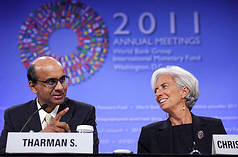
Typical street scene in Santa Ana, El Salvador. (Photo: iStock)
IMF Survey: IMF Members Vow to Confront Crisis, Prevent Escalation
September 24, 2011
- IMF policy-setting body expresses strong collective resolve to combat dangers
- Lack of confidence contributing to "precarious situation"
- Backs IMF action plan to strengthen defenses
Determined to prevent the global economy worsening further and plunging into stagnation, IMF members vowed collectively to do whatever it takes to tackle a “precarious situation” and restore both confidence and financial stability, Singapore Finance Minister Tharman Shanmugaratnam said.

Lagarde smiles to IMFC chairman Tharman, Singapore’s Deputy Prime Minister (photo: IMF)
IMFC September 2011
Although the epicenter of the current instability was in the euro area, the world faced “a combination of financial risks with a weakening global economy, and contributing to that is a problem of a lack of confidence, in particular, a lack of confidence in the credibility of policy actions to arrest the crisis,” said Tharman, who is chairman of the IMF’s main policy-setting body, known as the IMFC.
“We face a confluence of sovereign debt and banking risks, with the epicenter of that being the euro area. But it is underpinned and complicated by the fact that we also face a weakening global economy, especially in the advanced economies, including the United States, and there are signs of that already having effects in the rest of the world,” Tharman told reporters.
IMF Managing Director Christine Lagarde said she was struck by the common recognition and shared diagnosis of the problems, and the determination to act decisively. “There was no denial, no finger pointing, it was about recognition and support.”
Advanced economies at center of response
The International Monetary and Financial Committee (IMFC), which represents the Fund’s 187 member countries, said in a communiqué that the global economy had entered a dangerous phase, calling for exceptional vigilance, coordination, and readiness to take bold action from members and the IMF alike. “We are encouraged by the determination of our euro-area colleagues to do what is needed to resolve the euro-area crisis. We welcome that the IMF stands ready to strongly support this effort as part of its global role,” it said.
Advanced economies were at the core of an effective resolution of current global stresses. “The strategy is to restore sustainable public finances while ensuring continued economic recovery,” it said.
Critical is implementation by the euro area of a July 21 decision to increase the flexibility of the European Financial Stability Facility, maximizing its impact, and improve euro-area crisis management and governance.
Lagarde, attending her first IMF-World Bank Annual Meetings since becoming Managing Director last July, said the key to resolving the current difficulties in Europe, and particularly the Greek crisis, was “implementation, implementation, implementation.”
She presented an IMF action plan to help build up the world’s defenses and buttress stability in the face of flagging global growth.
She stressed that IMF members needed to move more quickly to officially approve previously agreed changes in IMF quotas and representation that would give greater say in running the institution to dynamic emerging markets.
Rising risks
The annual meetings have been dominated by market nervousness about difficulties in Europe over sovereign debt and banking risks. Financial stability risks have risen sharply in recent months, as slower economic growth, market turbulence in Europe, and the credit downgrade of the United States have weighed on the global financial system, according to the IMF’s latest Global Financial Stability Report, released ahead of the meetings.
The IMF presented a Consolidated Multilateral Surveillance Report (CMSR), the first time that it pulled together all its work on surveillance and global prospects. “The path to recovery has narrowed, but the path is still open, if action is taken now,” the report said. “Countries must adopt comprehensive action across all policy levers, and implement them in a globally-coordinated way. This is what is needed to secure strong, sustainable, and balanced growth.”
Pledge to act decisively
Tharman said members were prepared both to confront the current crisis and to take the medium-term steps needed for fiscal and structural reforms to put the world on a firmer footing.
“What we know is that no-one is going to be immune from problems in any one part of the world. Problems of the euro area in particular are problems that will affect all of us. We are not a decoupled world,” he added.
Lagarde said the world was at a critical juncture, but a lot had been done to tackle major problems, including improved financial regulation, better crisis management, tighter governance of the euro area, and strengthening bank capital. “So we are half way there. It is a question of pushing hard to get to the other side.”


